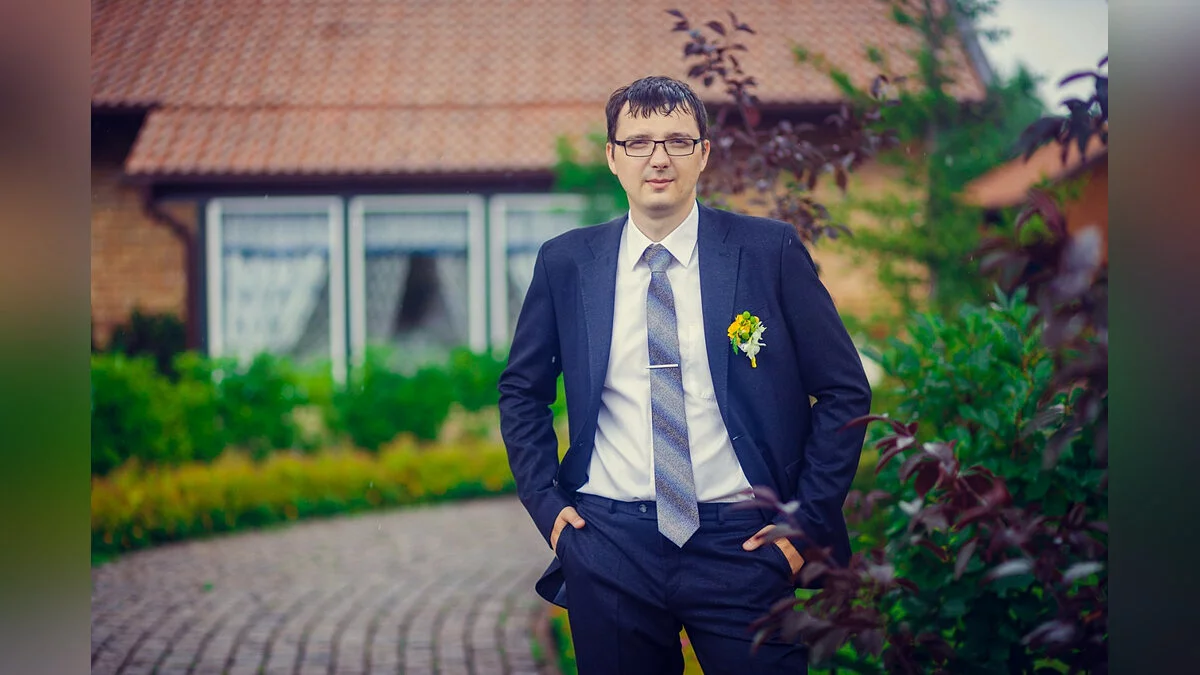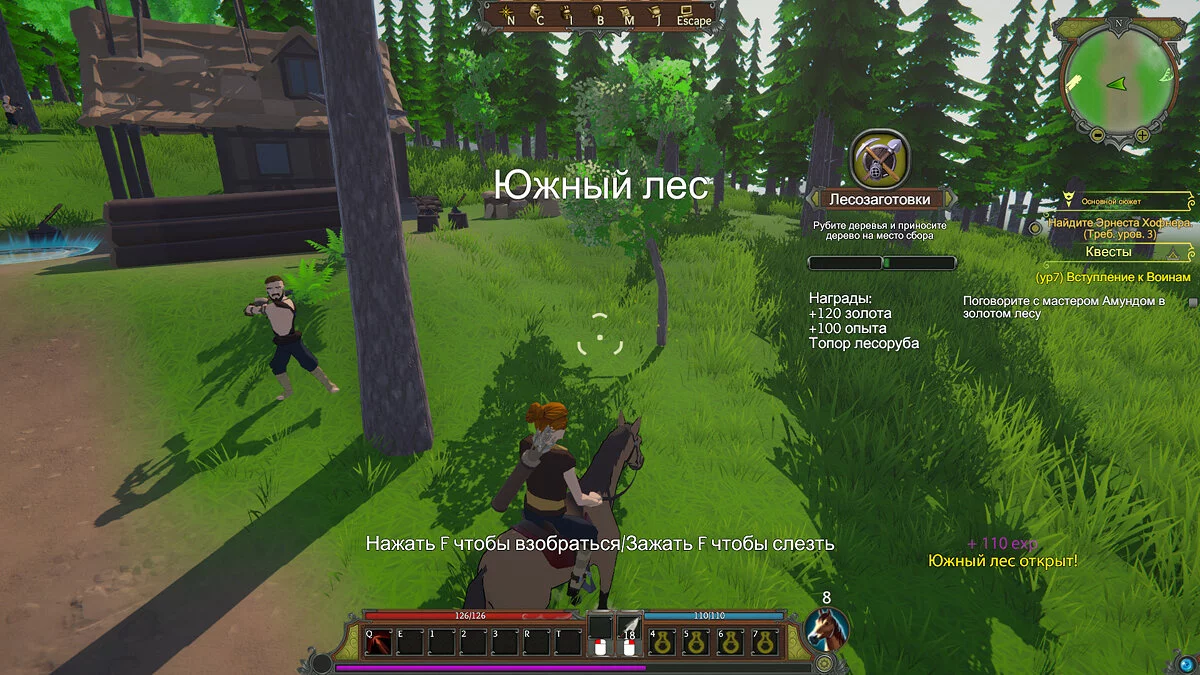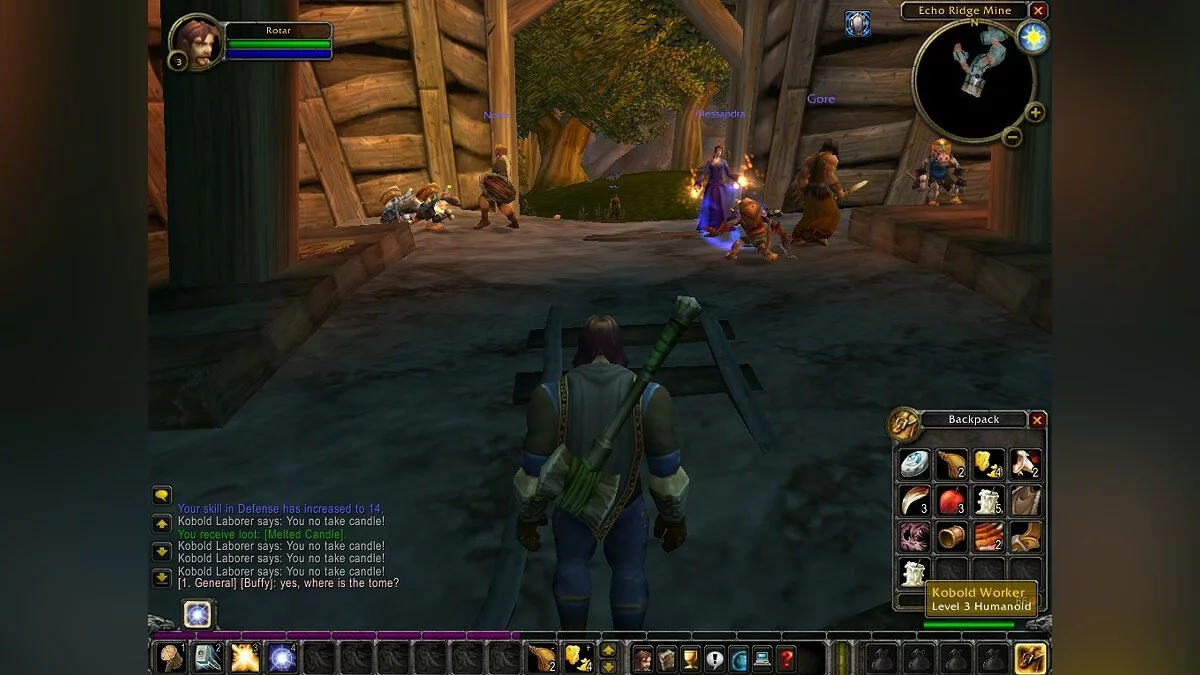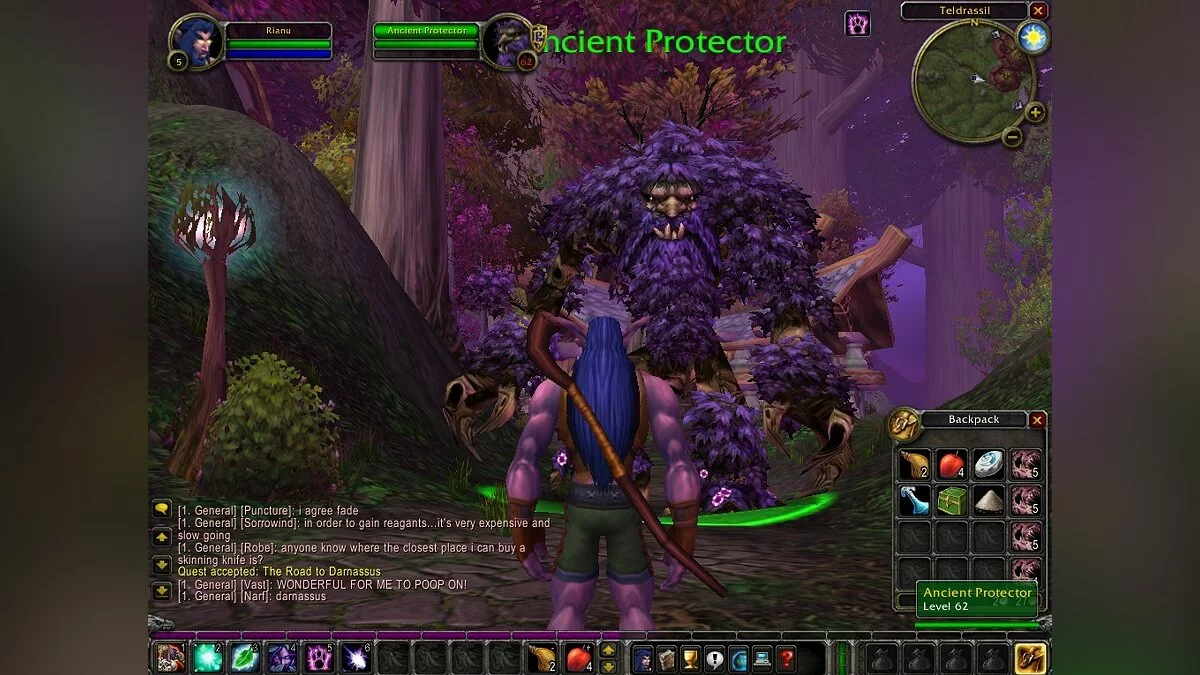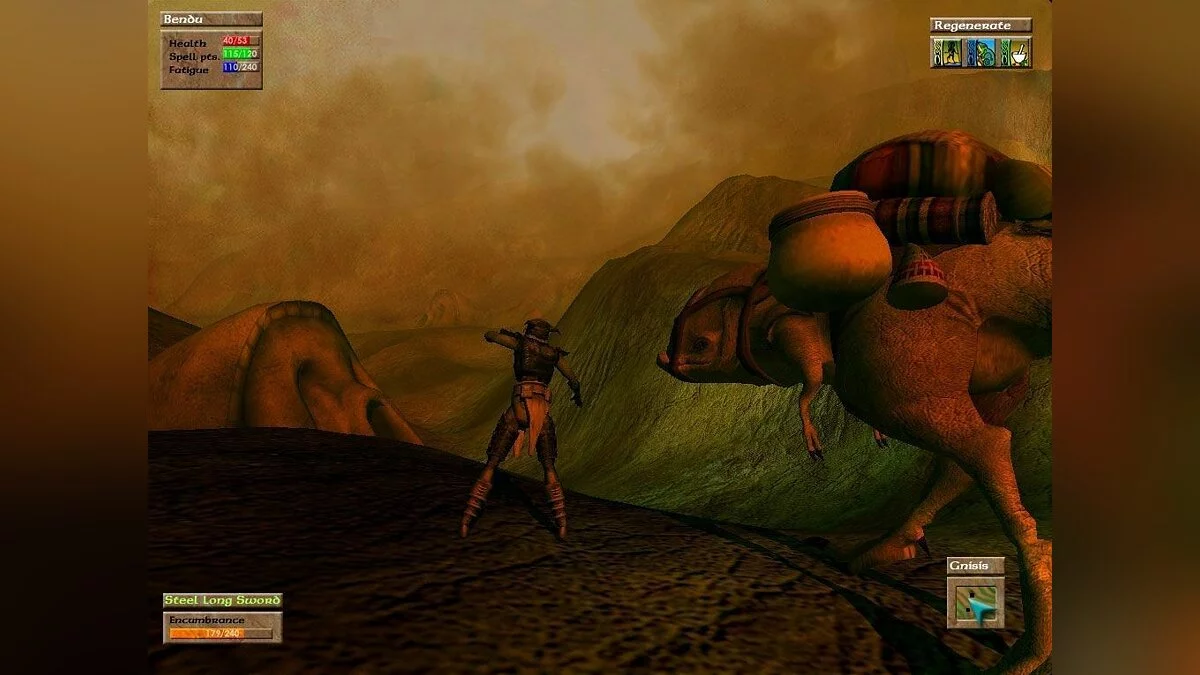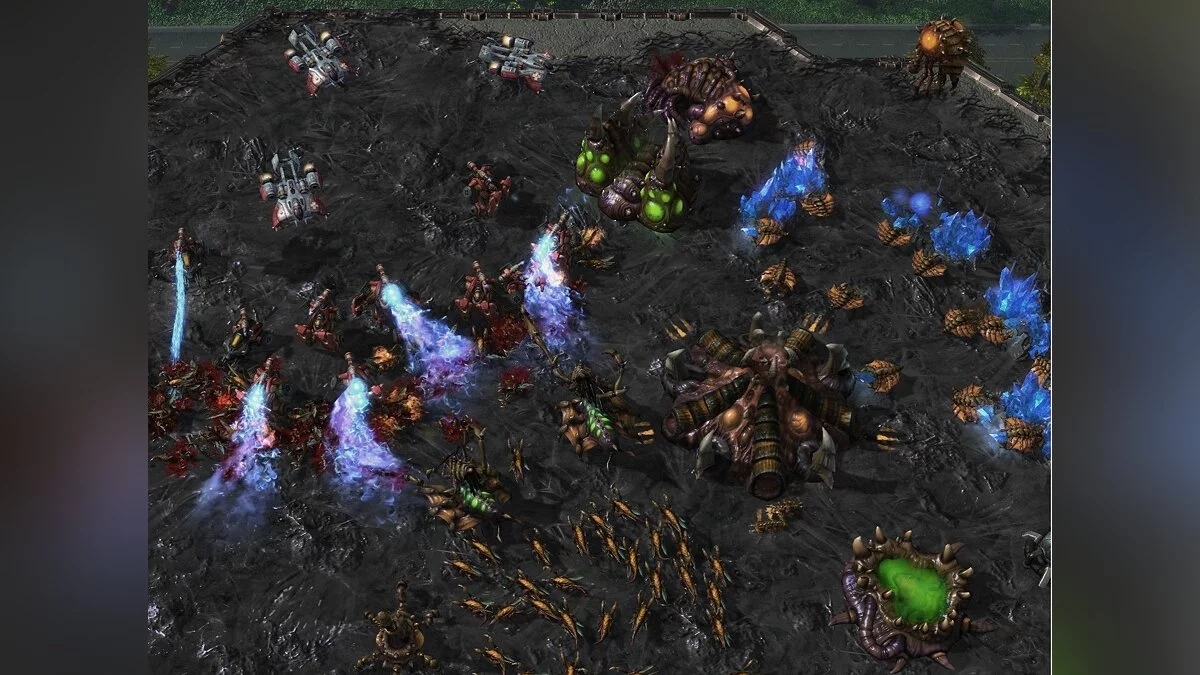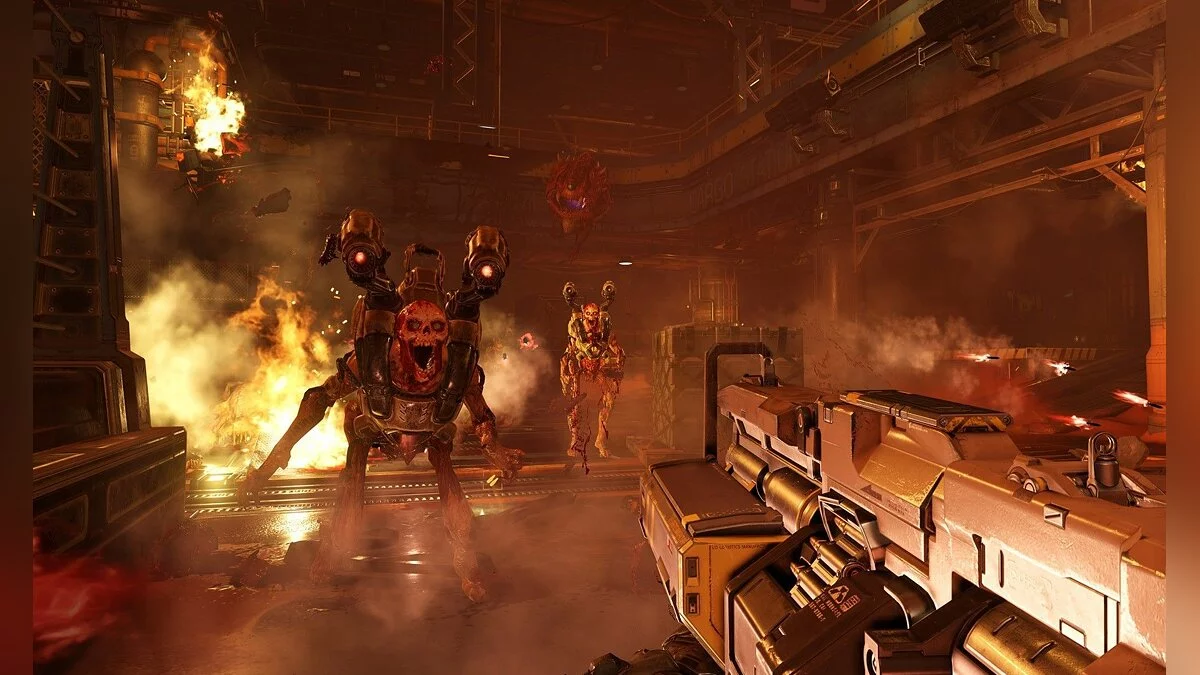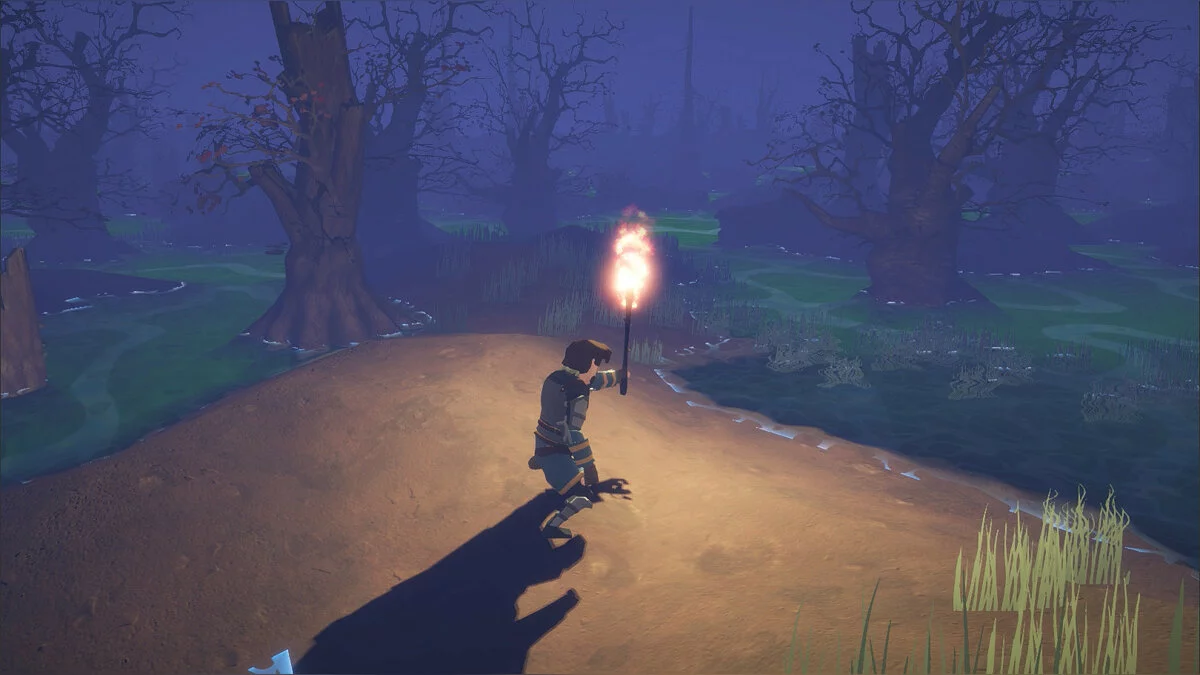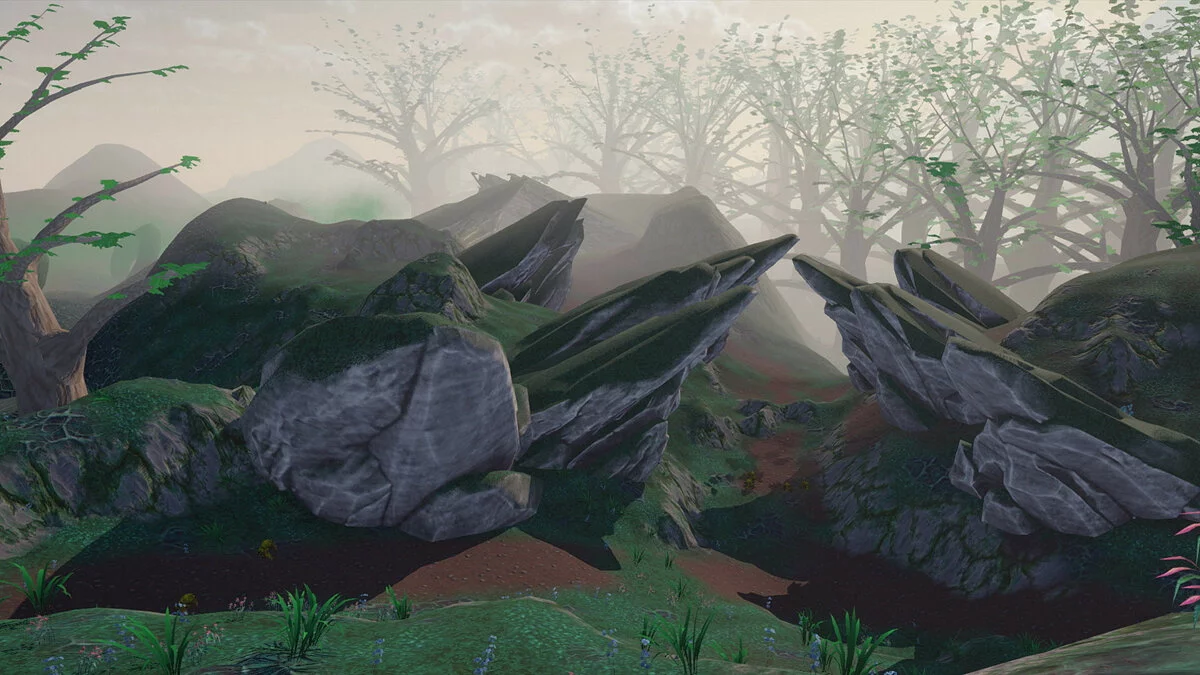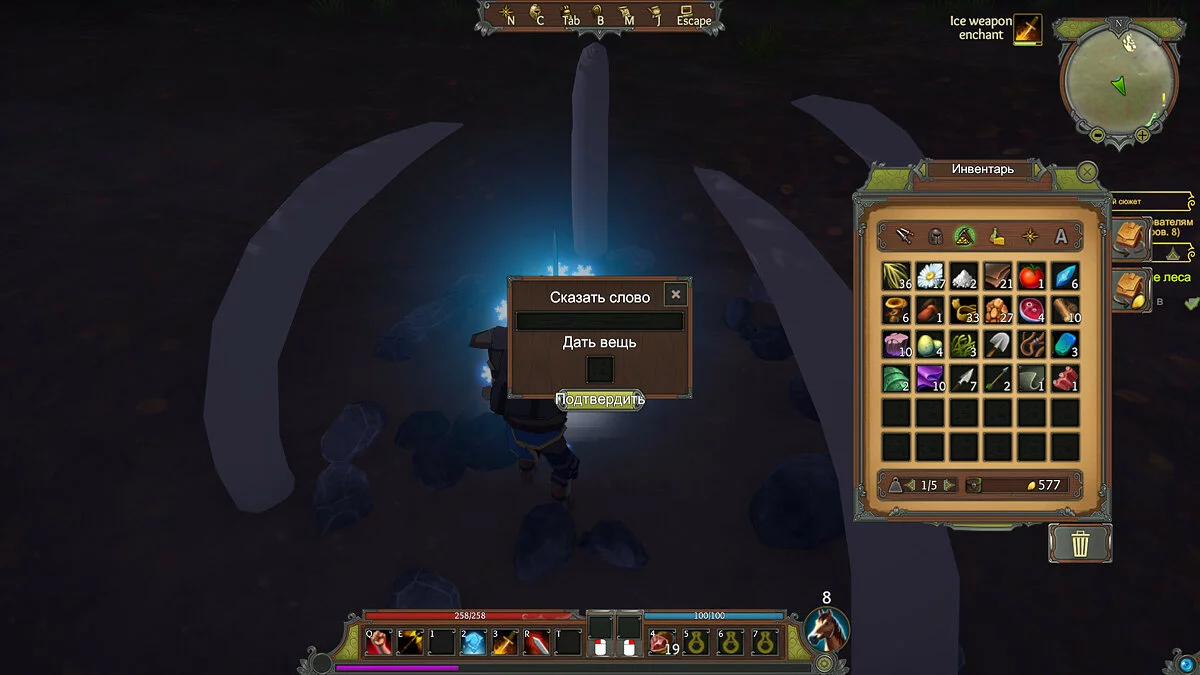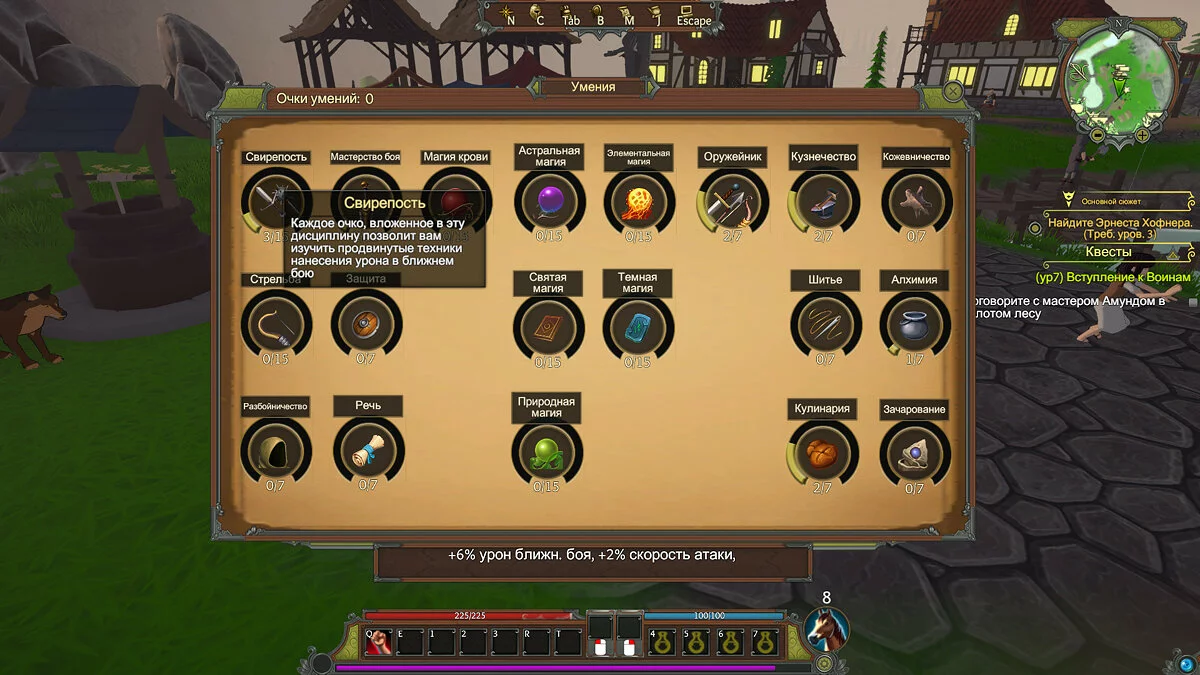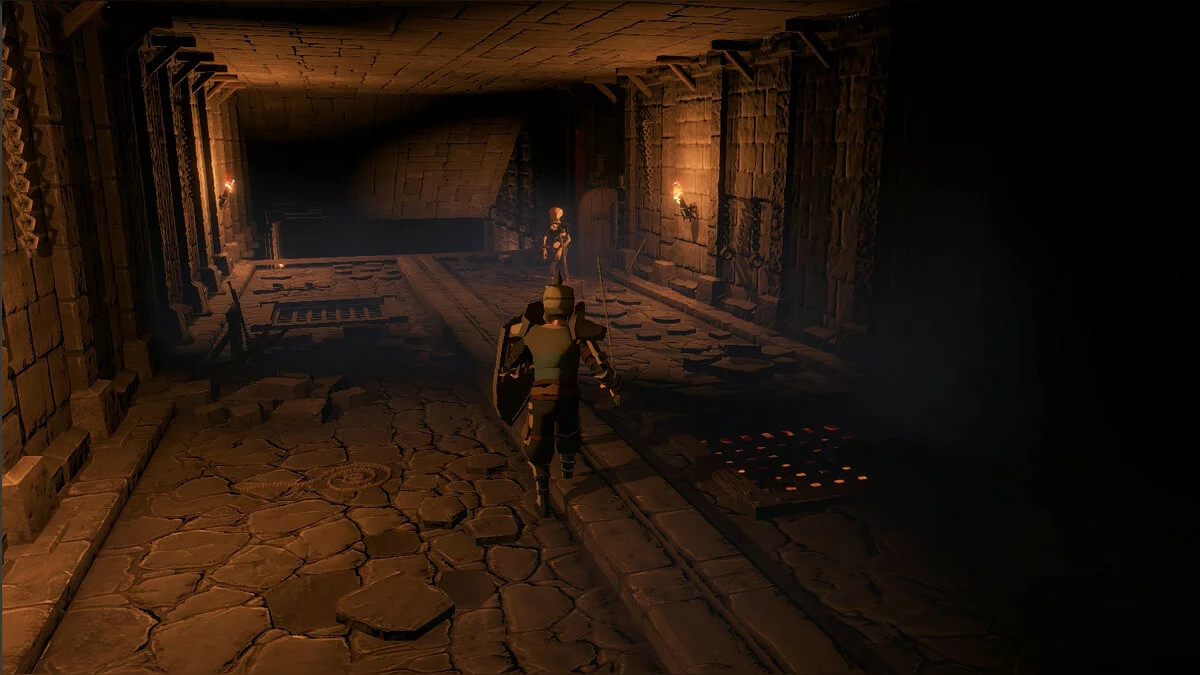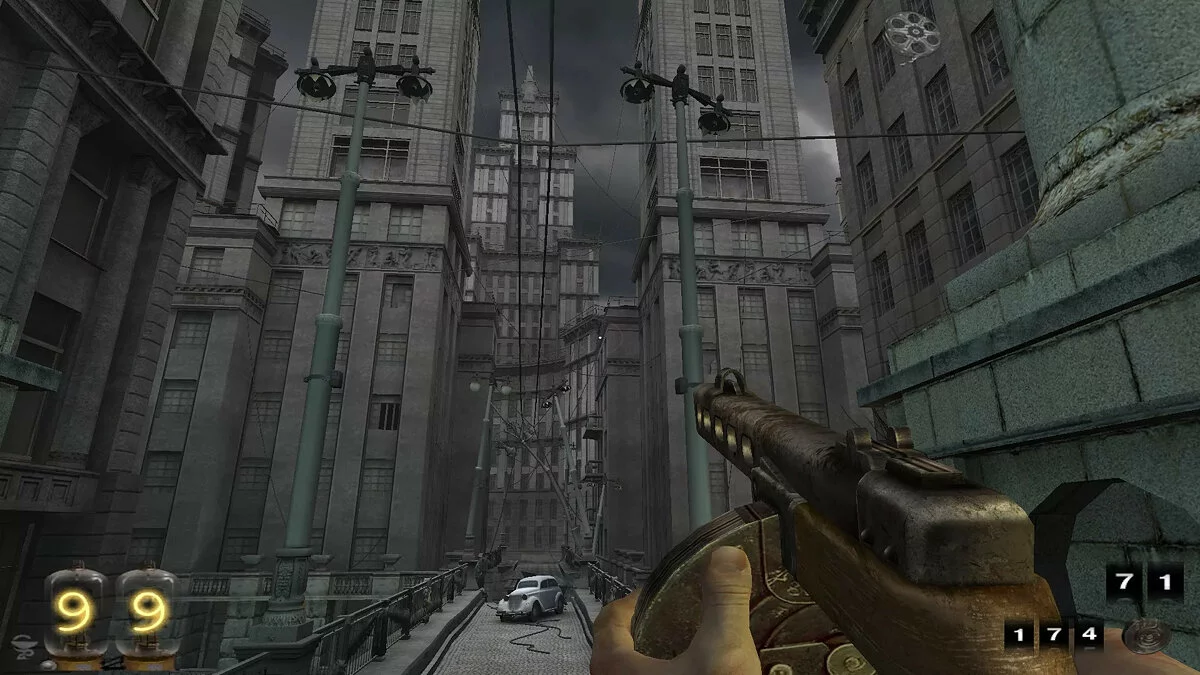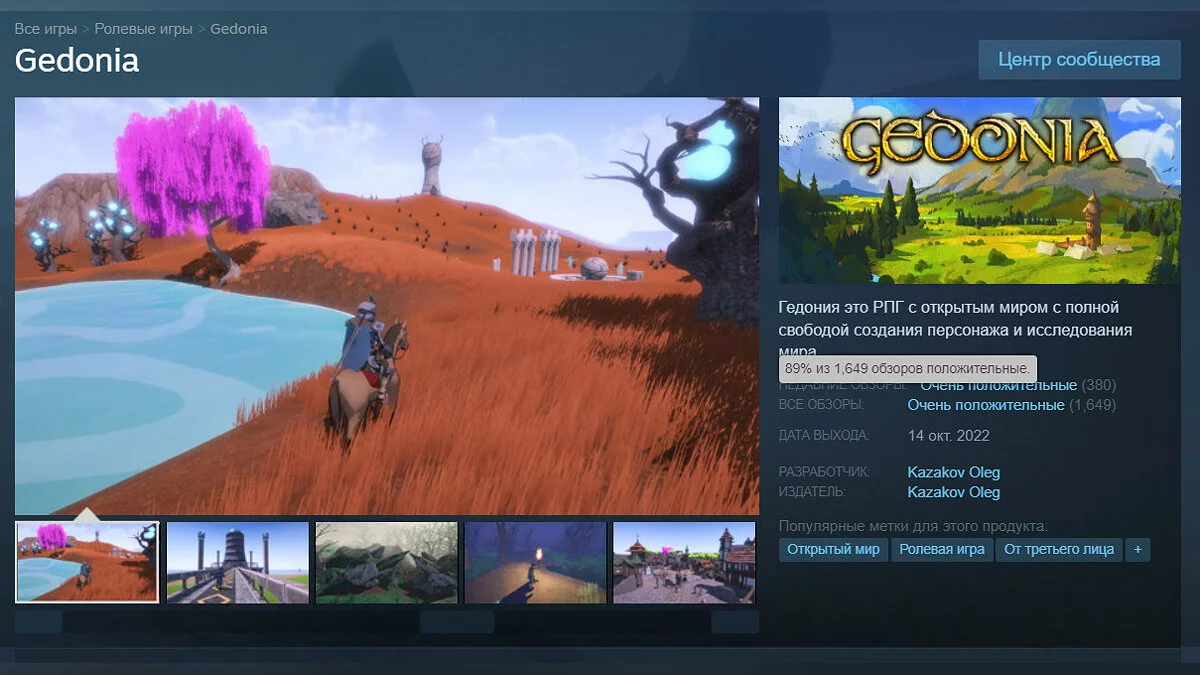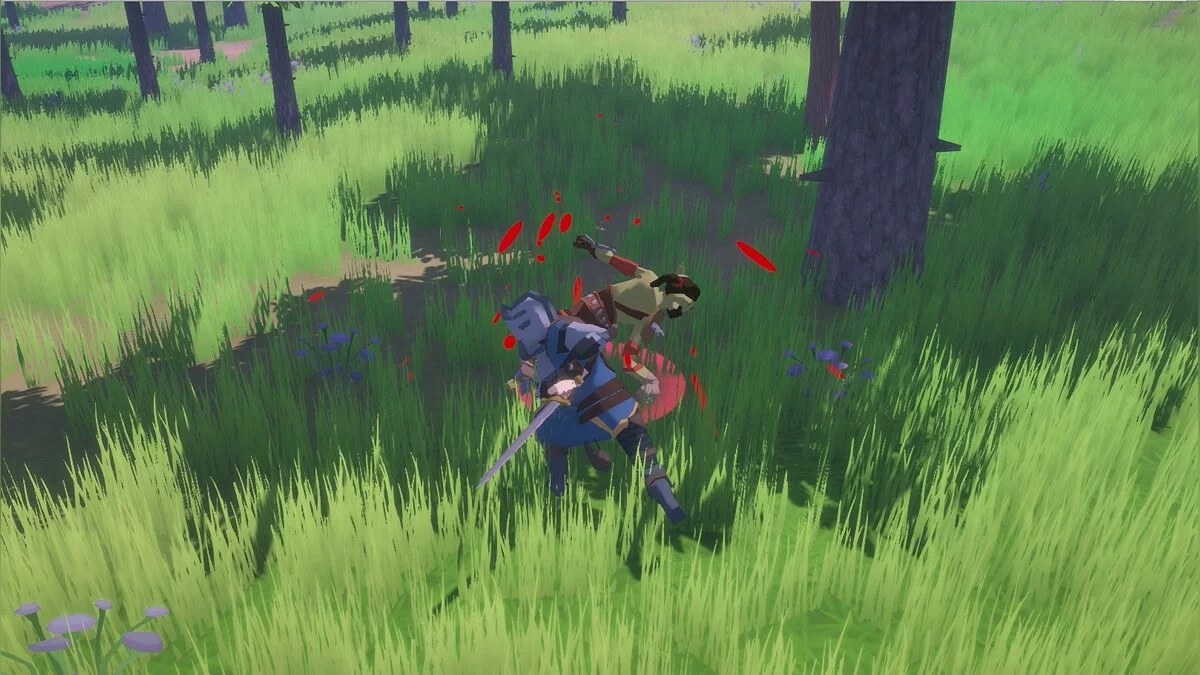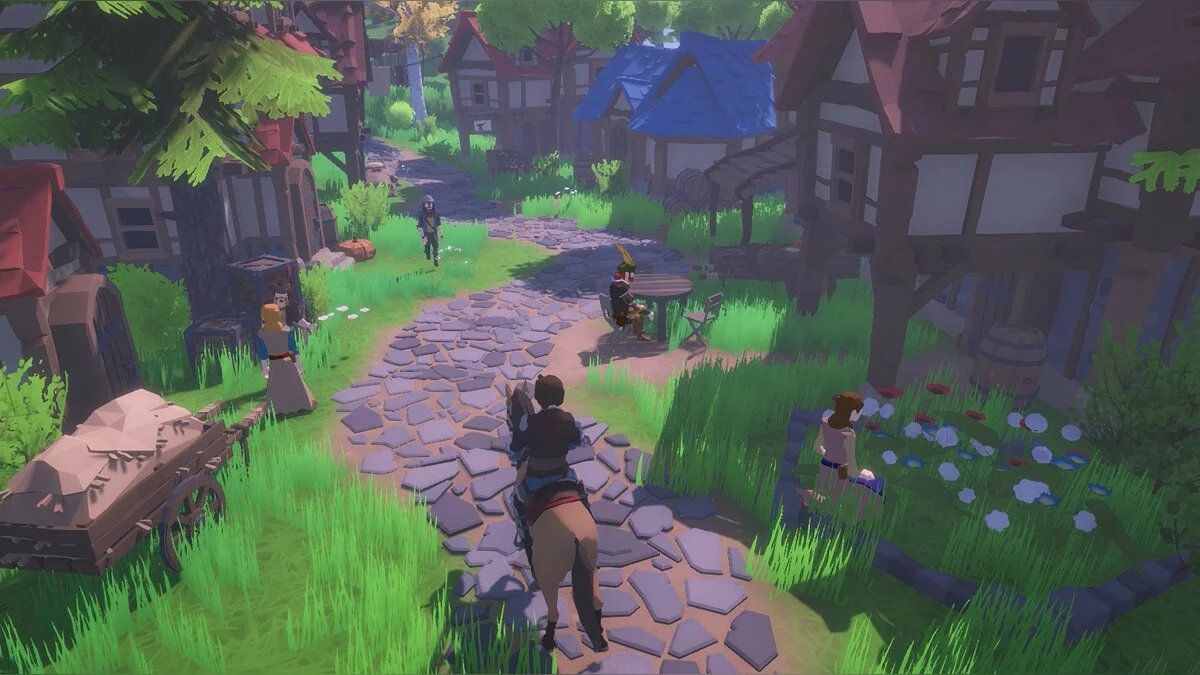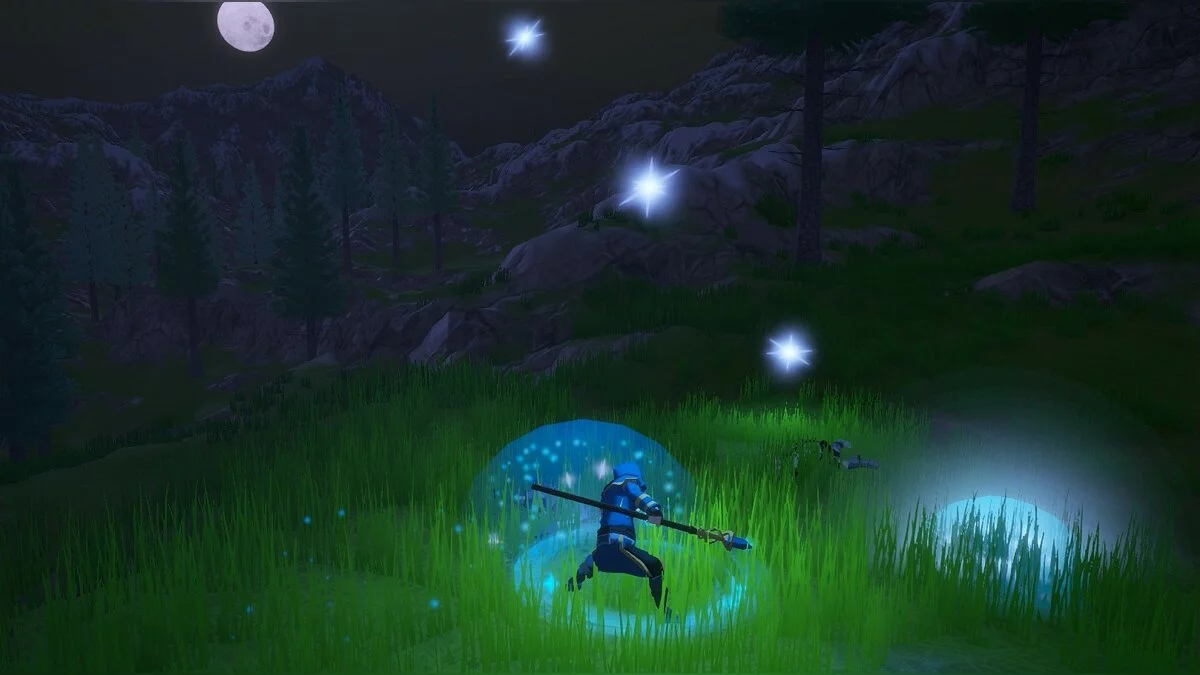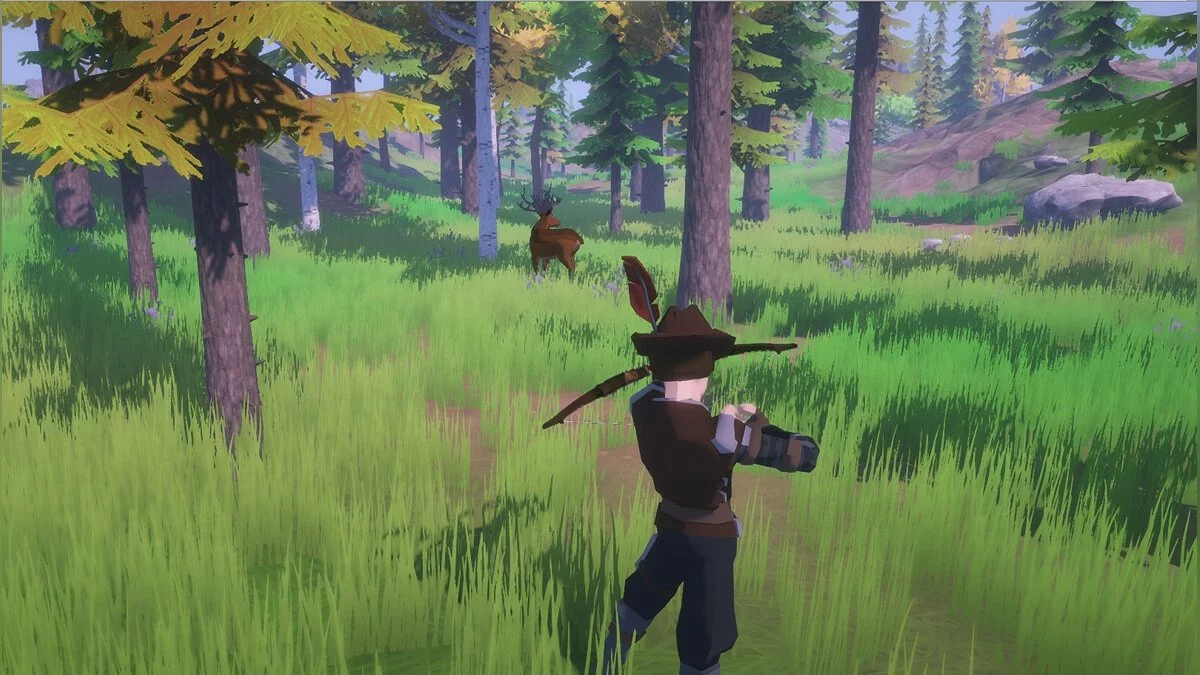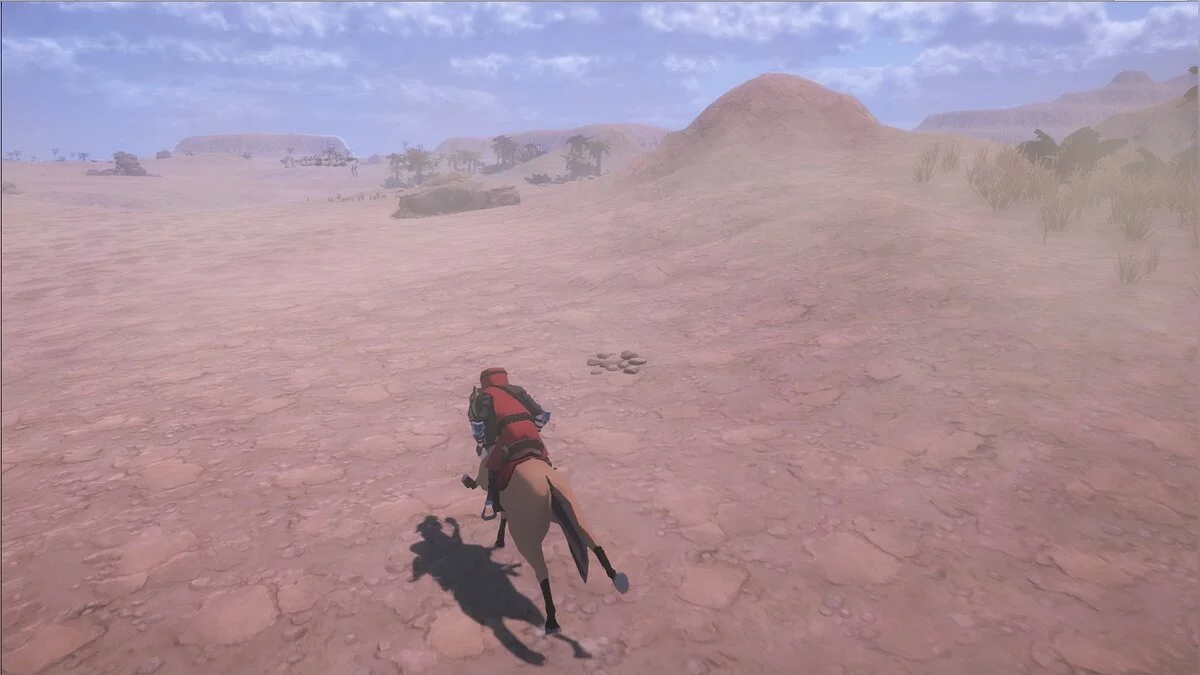VGTimes Interview with the Author of the Indie Hit Gedonia

Indie development is a difficult, painstaking and risky business. It is therefore all the more interesting to learn about the success of a domestic author who managed to break into Steam trends. We talked to Oleg Kazakov, the author of the open-world adventure RPG Gedonia. How can you «capture» Steam on your own? What do you need for this? What difficulties will you face? All about this right now.
What is Gedonia?
Gedonia is an open-world RPG about the adventures of an ordinary peasant who had to take up arms and go fight a mysterious evil. Despite the simple introduction, the game has a lot of content even for a small indie team.
And what's interesting is that the author really succeeded in trying to make a «dream game» that many of us dream about deep down in our souls. An open world filled with various activities such as quests, dungeons, puzzles and world events. A specially mentionable leveling tree, a simple but interesting combat system with a combination of skills and the atmosphere of the best RPGs of the 2000s. This is how we remember Gedonia.
Below in the text we will ask the author a question about his favorite games — and the spirit of these projects was felt in Gedonia. In general, everything in Gedonia is done according to the principle of «created what I would play myself.» Yes, there are rough edges and minor bugs, but the amount of work done is titanic.
A full walkthrough of the game can easily take forty or sixty hours, and additional modes will only prolong the pleasure and feeling of nostalgia for the wonderful times of classic RPGs. What will the author himself tell about the project?
About the emergence of the idea and the career of a developer
Oleg Kazakov: Hi, I'm an indie developer. I work alone, make my projects and release them on Steam. I've been doing this for quite a long time, in general, I try to make games that I myself would like to play. The latest projects have already had some success, but overall — nothing supernatural.
To put it simply, Gedonia is an open-world RPG that I always wanted to make, mixing ideas from projects that I myself played with — the The Elder Scrolls, World of Warcraft, Fallout series. Well, and the visuals from «Zelda», but that happened by chance, by trial and error.
VGTimes: How did the idea for the game come about?
Oleg Kazakov: The idea was worked out for a very long time. For example, initially the combat system was similar to that from Dragon Age: Origins. You had a group of heroes and you used the mouse to select an enemy to attack, but then, during the first alpha test, I decided to redo everything — no one liked the system. I made it closer to the action RPG genre.
And the idea itself, perhaps, has been there all my life. Well, a dream game, all that. I just never took it on. I had an idea with an RPG and when I decided to do it, I took several settings that I wanted to implement. By the method of selection, I decided to take on this one and then came up with a plot and everything else for it.
VGTimes: What mechanics and ideas inspired you?
Oleg Kazakov: Well, for example, the S.P.E.C.I.A.L. system from the first parts of Fallout. I really liked it and decided to implement it. In the new parts, of course, it is not like that anymore — Bethesda changed it a lot, turning it into a regular leveling system, and before it provided greater replayability.
The gameplay, for example, for a character with ten points of strength and one unit of intelligence was very different from other builds (such a character could not speak, the NPC was considered mentally retarded — editor's note). Something similar, albeit in a simplified form, I tried to implement — the character either has strengths and weaknesses, features, or he is «average» in everything.
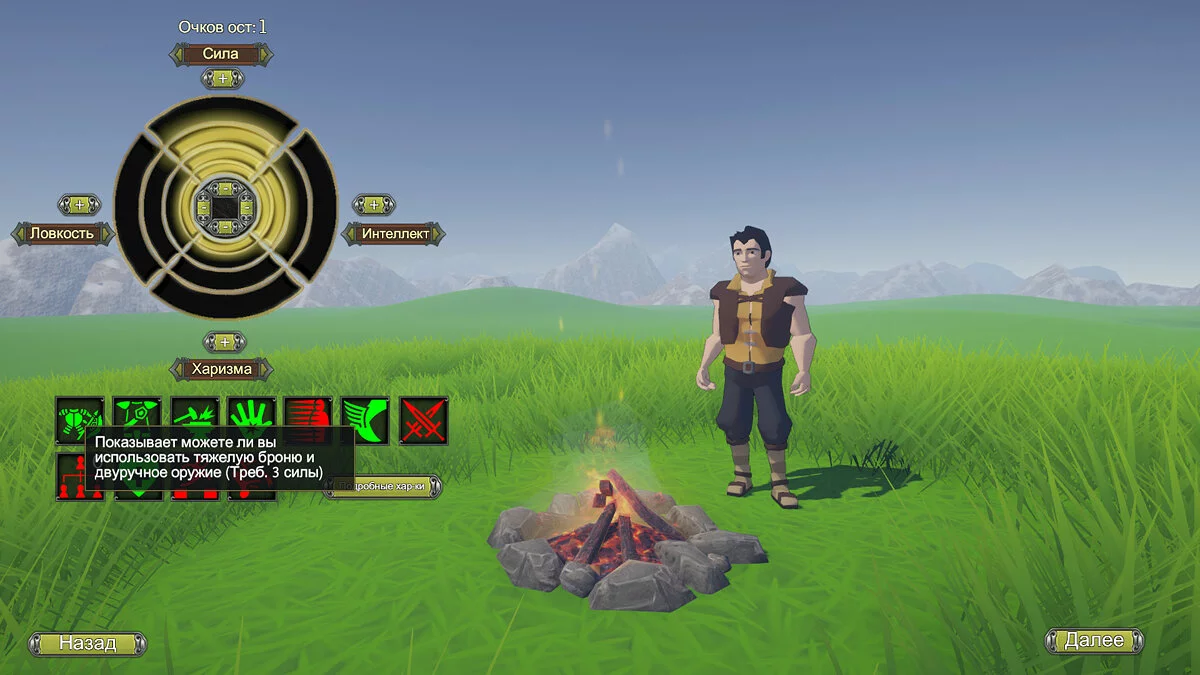
VGTimes: Now many want to «break into Steam», having only basic Unity skills and an idea. What skills did you have when you started working on Gedonia?
Oleg Kazakov: I have been working in this field since 2011. Until 2015, I made browser games for VKontakte and many simple games. Since 2015, I have been making a variety of projects: shooter, horror, strategy. Before Gedonia, for example, there was Galaxy Squad — something like XCOM. Anyway, by that time I had already gotten the hang of Unity, had everything I needed and decided that I could take on a project of this scale.
Gedonia is a very ambitious project and if you don't understand the engine well, you simply won't be able to implement it. And still, I made a lot of mistakes, for example, when implementing dynamic loading of the world — I had to spend a lot of time on it.
So there were no special skills, just a lot of experience.
VGTimes: Browser games? Flash? And did these projects bring in income?
Oleg Kazakov: No, I worked on Unity Web. There was income, of course, but these were little-known projects — pennies. For the first five years, I was developing «at a loss.» I worked, made games in my free time, and spent my entire salary on development.
VGTimes: What about soft skills? Should an indie developer be a jack of all trades?
Oleg Kazakov: In any case, you need to know 3D modeling. Even if you buy models, you will still have to remake them for yourself and optimize them. You will have to draw some textures, do design, sound. Of course, you need an understanding of game design to develop mechanics.
What else... Well, writing skills will come in handy, but not everywhere. In general, everything. Although now you can «close» skill gaps with plugins or freelancing. The most important thing is resource management. You must know what resources you have — strength, time, money. And how to spend them wisely.
VGTimes: That's exactly what I wanted to ask. How much time did you devote to developing Gedonia? And how did you relax?
Oleg Kazakov: Since 2015, I have been working on games full time — from morning to evening I made them. By that time, I could already live on the sales of released projects. And for three and a half years that I developed Gedonia, I created the game from nine to six, sometimes staying late.
I stuck to the usual «five-day week» — Monday-Friday. Saturday-Sunday you rest — spend time with your family, walk with the children. I used to be into computer games — I sat in the office, and then came home and played. Now I want to hang out more.
And then I played World of Warcraft — from 2005 to 2010. Sometimes I played singles — I played all the Bethesda games, played Kingdoms of Amalur: Reckoning, various strategies like Starcraft 2, the new XCOM, the fresh Doom. I tried quite a few different genres. Except for stealth and dating simulators.
On the development process and the cost of the game
VGTimes: Returning to the work process: did you prepare any design documents or roadmaps? How did you structure the processes?
Oleg Kazakov: Of course, you can't do without it. I made tables, created «tasks» for a day, a month, or more. Every day you sit and complete these tasks, otherwise your motivation will quickly run out. You need to feed yourself, shuffle tasks so that you don't get bored doing the same thing. Because everyone has limits — it's hard to work on the same thing.
The hardest thing for me is the final stage of development. When everything else is done, you sit and fix bugs day after day.
VGTimes: How did you track your work efficiency? Of course, there are all sorts of KPIs and financial indicators, but they are unlikely to be relevant for solo development. And since we're talking about attitude, how did you motivate yourself?
Oleg Kazakov: Well, as I already said, you set a number of small tasks and complete them every day. This already motivates you, you know that you are not standing still. Every day: set — completed. And by the end of the month, you compare — how it was a month ago and how it is now. And you see progress, some kind of improvement. Of course, there are no metrics, but it is important for yourself to know that you are moving forward.
And with experience you begin to understand: you skip the little things, do what is important first, and finish the rest later.
VGTimes: Indie development is sometimes a rather adventurous process. How did your loved ones react to your status as an indie developer?
Oleg Kazakov: I have a fairly understanding family who always have a positive attitude towards my endeavors. «If you like it, it works and brings in money — why not?»
And again, I started in the office as a tech support agent and even then I said that I wasn't going to do this my whole life — I needed to move forward, build a career, take risks, so as not to sit around «for a salary» my whole life.
VGTimes: And what about finances? After all, development is an expensive pleasure. You need to support your family and cover various expenses. Was it enough?
Oleg Kazakov: Yes, my previous game, Galaxy Squad, just allowed me to work on a project like Gedonia. I had a certain financial cushion that allowed me to work hard on the project for a whole year, before early access. Otherwise, I would have had to take on part-time jobs, because it's impossible to make a product for years without financial investments.
From 2011 to 2015, I was single and worked in the office, earning pennies. This was enough to live on and I was essentially learning. I didn't spend money on marketing, I occasionally bought software and learned, investing my own time.
Later, after releasing the first successful projects on Steam, I could provide for my family and seriously invest in development.
VGTimes: And how much did it cost to develop Gedonia?
Oleg Kazakov: Well, there are two answers to this question. The first one takes into account only the cost of resources for the game: programs, assets, marketing, various models. The second one takes into account the number of hours spent and their cost.
If you count regular money, the project cost about 30-50 thousand dollars, I didn't count exactly. This is, in principle, the most expensive project I've worked on. And about labor hours... I don't even know how to count — utilities, food, family, life in general. If you add up the average expenses for all this and multiply by three and a half years, you get exactly the cost of the game.
It's clear that for game development these are ridiculous budgets. Gedonia can be considered a low-budget project.
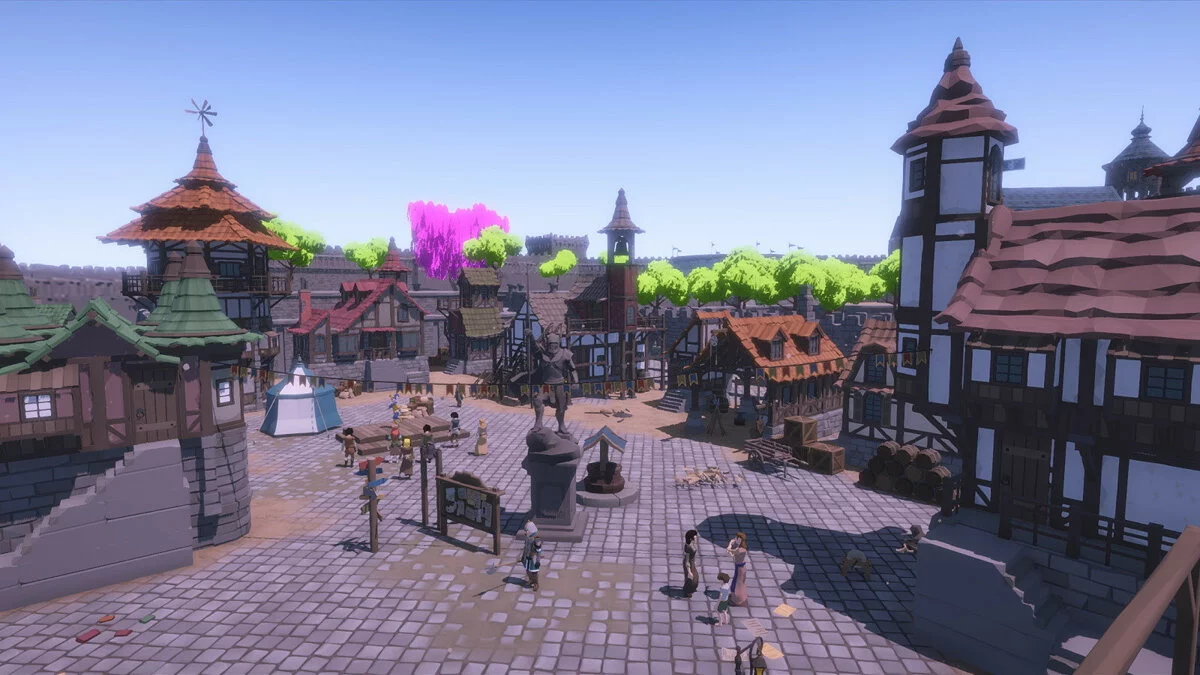
VGTimes: Well, thirty thousand dollars for resources is quite a lot for a Russian indie developer. Some people churn out games almost «on their knees»...
Oleg Kazakov: Yes, I also made most of my projects «on my knees». My previous games, shooters and horror, were all made «on my knees». I guess I was lucky. I had a lot of failures. Many of my games in the past did not pay off in terms of the time spent. But I just kept working — step by step.
VGTimes: Speaking of expenses: did you often use freelancers?
Oleg Kazakov: Actually, quite often. Some models, writers' services, native speakers and voice acting. I mostly outsourced this project. In previous projects, I did it myself, but here... You can't pull off such an ambitious project alone. Even though I write that I'm alone, I've been helped many times. Although I wrote half a million lines of code.
About the results of development and favorite mechanics
VGTimes: Gedonia was released quite recently. However, have you already managed to sum up some results? Did you manage to implement everything?
Oleg Kazakov: Yes and no. Some things, like the game's visuals and animations, did not turn out as good as I would have liked — I hit the ceiling and couldn't do better with such a budget. I couldn't optimize the game in some places — I hit the engine's limitations: I don't have access to its source code and I simply can't fix some problems.
On the other hand, I added more content than I planned. For example, I didn't think about mod support at all, some high-level activities, additional dungeons and mechanics — all this appeared during development. Overall, of course, I'm satisfied with the result.
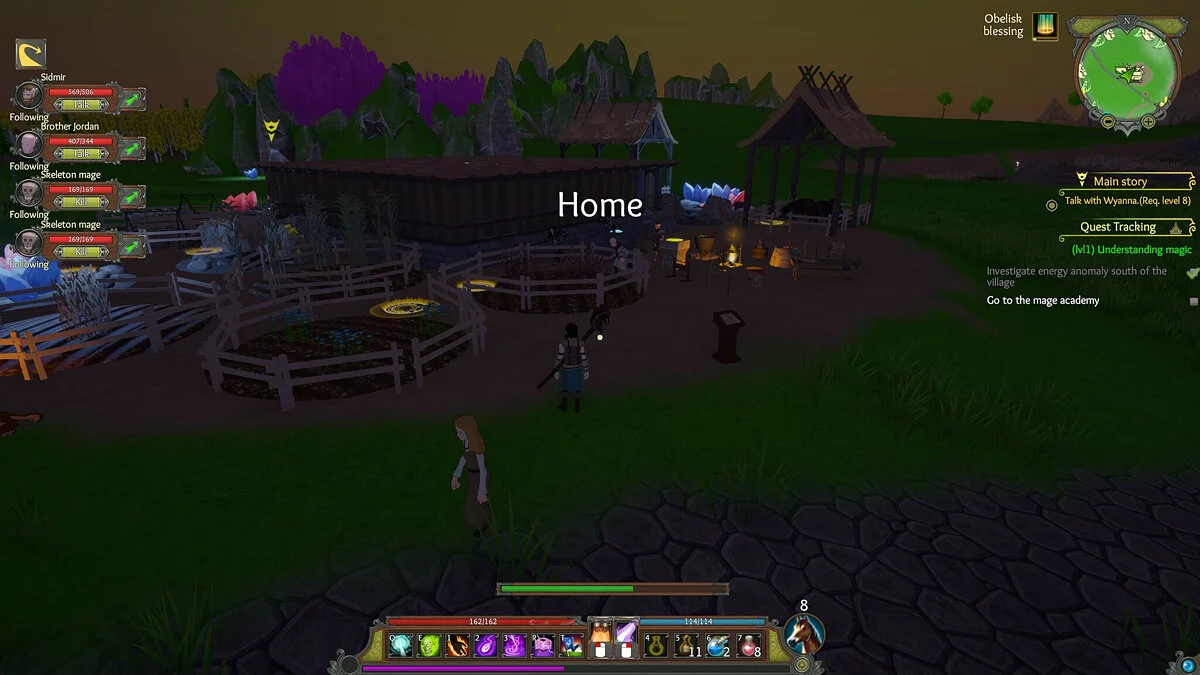
VGTimes: What emotions do you feel from the release of the game?
Oleg Kazakov: Everything seems a little unreal, as if it is not happening to me. I have had many starts, but this is the biggest. Now Gedonia is in 25th place in the top sales, it even briefly pushed aside Elden Ring. It seems incredible.
Speaking about the emotions themselves — probably a little bit of everything. First of all, of course, fatigue. The final spurt was exhausting. The release window will pass, everything will calm down, and I'll go on vacation — a couple of weeks.
Then I'll think about the future. The plans include supporting the game with patches and DLC, I have ideas for the next projects. I need to gather my strength and understand what I'm ready for — some small game or another big project for several years. I want to figure myself out. Although now I just want to relax.
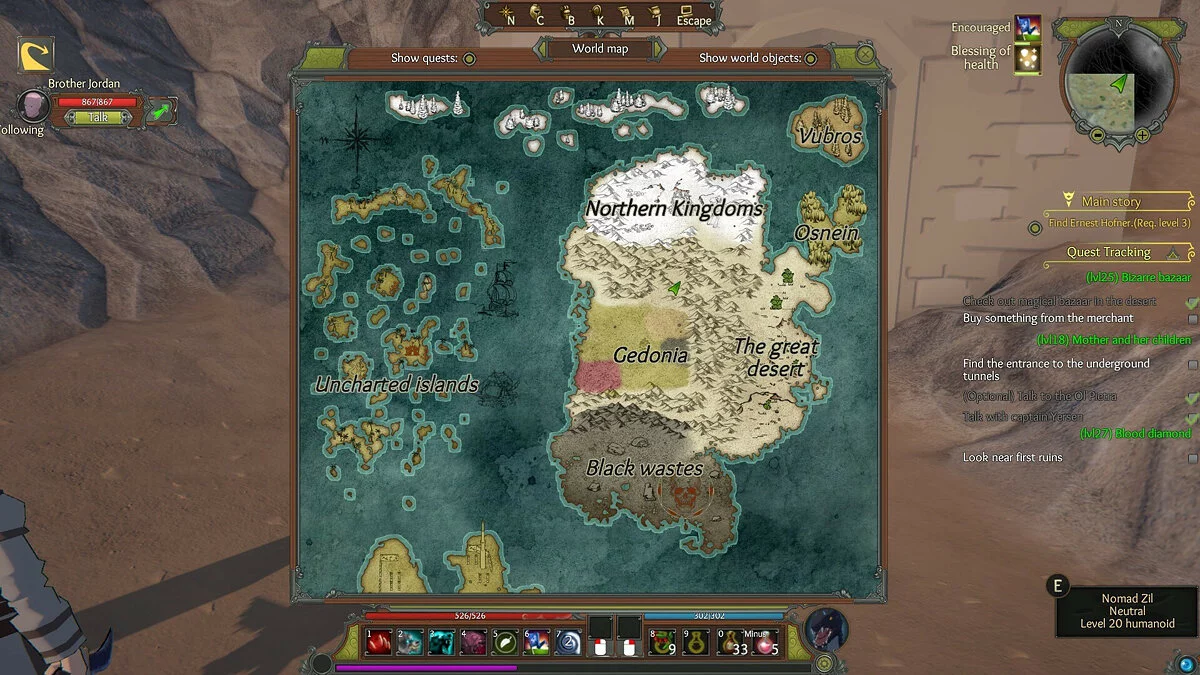
VGTimes: Was it the hardest part at the finish line, when you were catching bugs? Or were there other moments that made you clutch your head?
Oleg Kazakov: Yes, of course, there were such moments, especially at the start of early access. Back then, the game was crooked, with a bunch of errors, and I fixed dozens of bugs every day. Some of them took a long time to fix.
The game is big and everything is interconnected. There were moments when fixing one bug led to three others. And so you sit, clutching your head, and think about how to fix everything. Sometimes until the night. It was the hardest project in my life.
VGTimes: Speaking of mechanics. There are really a lot of them in the game. In your opinion, did they manage to combine them correctly? Do some of them feel unnecessary?
Oleg Kazakov: For the most part, they fit together into a single picture. You have a classic set of mechanics for a role-playing game — quests, combat, crafting, leveling up, construction. They are known to players, they quickly understand them.
Then the player encounters additional mechanics like puzzles in dungeons. But here it's a little different — you focus on a specific mechanic unique to each dungeon, and soon you figure it out. I tried to make all the dungeons unique.
And, of course, I tried not to overload the player. Ease of learning is one of the factors of Gedonia's success. You enter the game and everything is clear to you right away.
VGTimes: Which mechanic did you struggle with the most?
Oleg Kazakov: Somewhere around level 25 there is a dungeon in the desert. Inside the temple there is a temple with panels on the floor. You step on it — it lights up, you step on it again — it goes out. There are symbols scattered nearby that you need to assemble from panels.
For example, you build a square — the door opens. You go inside — there is another symbol. You hit it, the door closes and opens again. There is a new room behind it. And it turns out that one door leads to several rooms.
It was very difficult to implement something like this. In fact, those eight rooms behind the door are superimposed on each other in layers. And I spent a long time struggling with various bugs that arose because of this. For example, opponents from one layer fell onto another, some objects did not disappear. It even happened that one room was superimposed on another. But in the end, the mechanics of these rooms became one of my favorites.
VGTimes: By the way, I wanted to ask about this. Was this level your favorite?
Oleg Kazakov: Probably... Although there are several mechanics that I really like. Not even just mechanics. Each dungeon is special for me, I put my soul into it, it is a separate adventure.
Probably my favorite «dungeon» is an abandoned mansion. You get there and learn the story of a ghost, walk through closed rooms, fight, examine the interior and discover the story of a ghost.
He killed everyone in the mansion in the past and walked alone for so many years that he forgot about what happened. And you reveal to him the truth about what he did. And then, like in old quests like «Petka and Vasily Ivanovich», you have to poke at various objects and solve riddles. This is, in essence, a dungeon quest. At the end, you kill the ghost, and he pours out his soul to you.
This «dungeon» is probably one of the best in terms of narrative. It is probably my favorite. And I spent a lot of time on it — after all, it is a gigantic mansion, everything needed to be optimized. A lot of work was done.
VGTimes: It is hard to even imagine what it is like to walk around the world you created, remembering every model on display. An incredible feeling.
Oleg Kazakov: Yes. This feeling motivates you to continue and not give up, even when there were financial difficulties.
VGTimes: What quality would you call the most important for a solo developer?
Oleg Kazakov: Time management, probably. Or coding. Although, I think many developers will disagree with me. Many make basic game mechanics, but with very cool visuals.
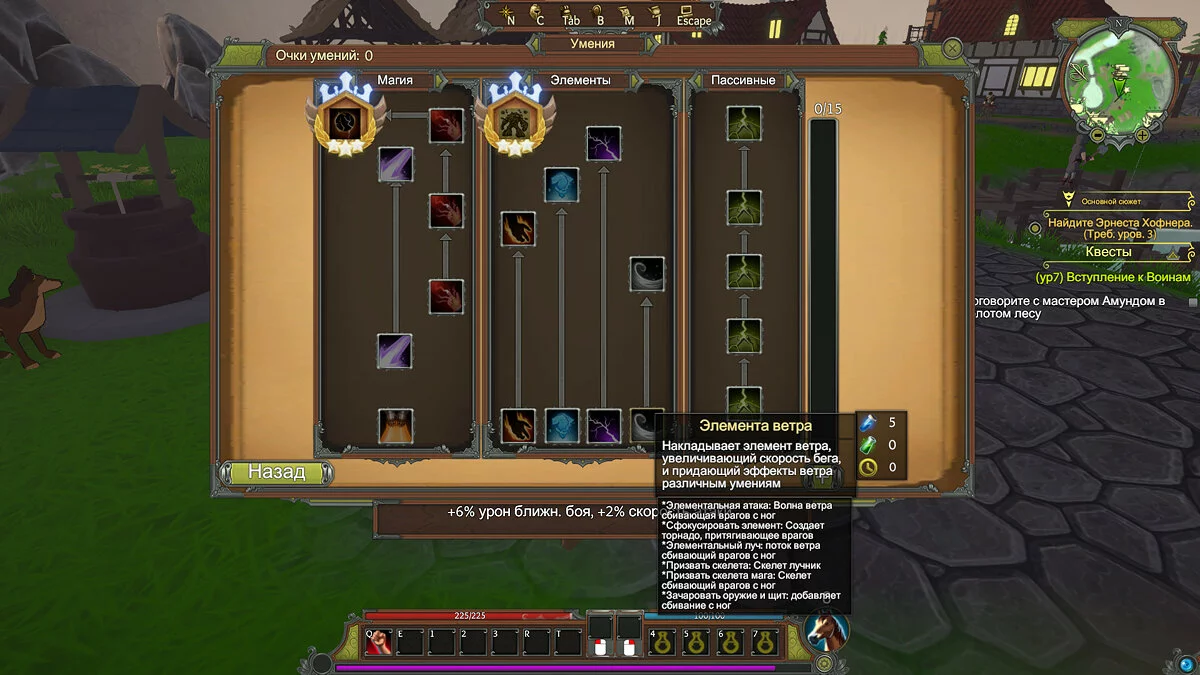
VGTimes: And what is the most important lesson you learned from the development of Gedonia?
Oleg Kazakov: Well, it's hard to single out some «most important lesson». It's too complex a process. I've definitely begun to understand the value of marketing. Got an idea of how to support a game in early access, various useful skills. I realized that it is not worth releasing patches at the end of the week, so as not to sit on edits all weekend.
About plans, marketing and income on release
VGTimes: You mentioned the next project. Do you have any ideas on this part?
Oleg Kazakov: There are a lot of ideas. I just haven't thought them through yet. As they say, I have a whole wagon of ideas, I can throw them around all day long, but implementing them is another matter. The latest cool idea is to make a survival game in a totalitarian city, in the style of brutalism.
Such oppressive structures, the Soviet Union, elevated to the absolute, or the movie «Equilibrium». Make a survival game in which you need to run from the government, look for food, do government work. The idea is cool, but it probably needs a multiplayer.
There is no point in moving towards another genre yet. It would be stupid not to use all the developments from Gedonia in the field of open-world RPG. So — some kind of RPG. There are a couple of ideas for the sequel to «Gedonia» — sci-fi RPG. Lots of ideas.
VGTimes: Speaking of ideas! Many novice developers stumble over ambition — they aim for overly complex and comprehensive projects, and then abandon them. How did you manage to avoid this?
Oleg Kazakov: Well, I had a moment in 2017-2018 when I started and abandoned a dozen such projects. There is no universal solution, except to pull yourself together and finish one project, as they say, to the end. It doesn't matter whether you like it, whether you consider it the «idea of the century» or not. Just take it and finish it.
With experience comes the ability to complete projects. This is probably the most difficult thing in our business. When I started, many projects were abandoned — I have a whole cemetery of them. All these funny, incomprehensible crafts have been stored in the archives since 2011.
VGTimes: Returning to our time — what about marketing? If we summarize the experience of promoting Gedonia, which techniques turned out to be the most successful?
Oleg Kazakov: Perhaps the most useful tactic was the «targeted advertising on Reddit». No spam. We create an account on the site, accumulate reputation, and then begin rare but effective posting of correctly composed (dynamic, interesting, attractive) «gifs» with traffic redirection to Steam.
You will have to accumulate reputation for a couple of weeks. The title for targeted posts is very important — you need to immediately show that you are an indie who is ready to actively discuss the game. Well, it is also important to insert either the name of the game or a link to the site, so as not to waste the traffic received.
Most of the «gifs» will fly by, but there is a chance that one of them will «shoot». I got 82.5 thousand likes with such a «gif», two and a half million views on the «gif» and five thousand additions to the «Wishlist» in a couple of days. This boosted the game's overall performance on Steam and pushed it into «Popular Upcoming Products». Overall, it definitely makes sense.
A lot depends on the visuals — if there is good material, if the game has style, it is easier to advertise. If the game looks boring or unsightly — no matter how much money you invest in marketing, there will be no effect. Everything depends on the quality of the product itself.
No more revelations. Work with social networks — gifs, posts, general activity. It is important to at least do something, because many do nothing, and then release a project that no one buys.
VGTimes: And how did the restrictions in Steam affect sales? As far as I know, you started selling keys in the official group of the game.
Oleg Kazakov: I don't think they affected much. In the West, if you have achieved a certain success, the game will sell, and our audience has adapted — there are ways other than selling keys. These are temporary difficulties that we will overcome.
VGTimes: By the way, about time. How do you see yourself in five years? A loner or a team player?
Oleg Kazakov: Well, of course, I want to have a team. This is a big step forward, a big responsibility. You need to provide for people, pay them a salary. But you need to proceed from financial indicators.
Gedonia turned out to be successful and there is an opportunity, perhaps, but I have not decided for myself yet. Now I will rest, and then I will think — whether I am ready to continue projects alone or start recruiting people for the team. Time will tell.
VGTimes: You once mentioned income of six million rubles. Has the situation improved much in a year and a half?
Oleg Kazakov: Well, there was a slump during early access — I earned less throughout 2022. But the release was strong. It's still ongoing, but I've already sold five thousand copies in a day. Again, it's not like they just get into the Steam top sales.
I was afraid that critical bugs would pop up during the release, but so far they've been fine. There are some minor issues, but nothing dangerous. So overall, I'm happy with the release.
VGTimes: The last question that comes to mind because of the situation in the world. You're still in Russia, haven't you decided to leave?
Oleg Kazakov: I'm in Russia, yes. Well, I don't think they'll take me away. Who needs me — I don't have any experience. I don't think it will affect me, although I did think about leaving. It's too big a step for my family, I didn't force it, and over time I adapted. And now there's mobilization... It's scary, of course, that they'll take you away, but I'll cope. Everything will be fine. And if they take you away, they'll take you away. I'll die somewhere there, in a trench.
VGTimes: Let's hope for the best. The Russian gaming industry definitely needs developers like these. Maybe there are things you'd like to mention?
Oleg Kazakov: I don't even know. Like it, subscribe to the channel and check out the game? There are plans, we'll make additions, we'll sort out the problems. In general, we'll see what happens in the future.
Maybe I'll make a franchise — a sequel or a remake with feminists and American actresses like Melissa McCarthy.
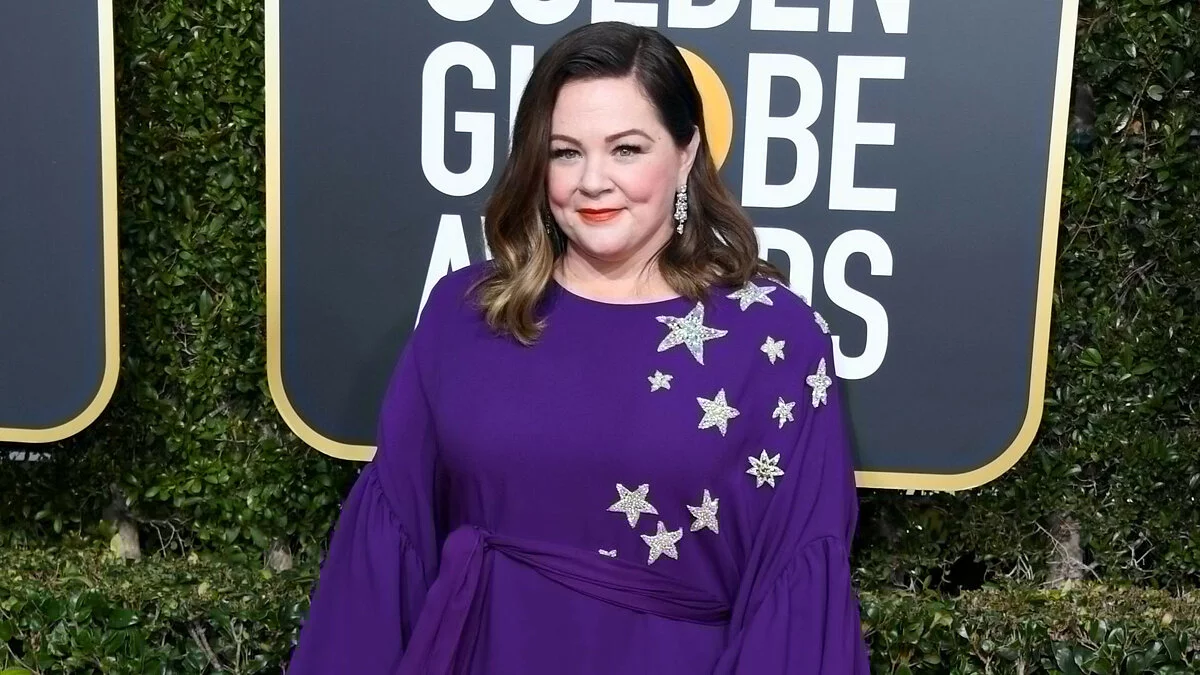
My game is often compared to The Witcher or Skyrim. On the one hand, I understand them. When a project is ambitious, what else can you compare it to? On the other hand, it's stupid. Some studios have been making games for years, they have super-experienced developers and huge budgets. They're in too different weight classes.
But of these comparisons, the most important and appropriate for me is the first The Witcher. Because it came out, it was crooked, outdated, but made with soul. It had average success. Players played it and said — keep doing it. Then there was the second «Witcher», the third… Well, we all know what was in the third «Witcher», what it did for the industry.
For me, the first «Witcher» is about how I feel. That is, maybe I'll take this step. I'll gather a team, do something cool and incredible. Or not. But I want to believe that something like that will happen in the future. A project that will advance the gaming industry somewhere.
The guys are currently making «Trouble». They were given money. I want to see what they come up with. Atomic Heart, «Tarkov» — our industry, it seems to me, is on the rise. We are making not only mobile and browser games. We are trying something, this inspires me a lot. Let's see what happens in the future.
VGTimes: You couldn't come up with a better ending to the interview. Thank you very much for the conversation! Once again, we wish you success with the release and with future projects.
* * *
The release of Gedonia once again proves that even alone (almost) you can make a great project that will succeed and win the hearts of players. Of course, this will require a lot of effort, wisely allocating time and resources. We hope that Oleg Kazakov's next project will achieve even greater success and conquer the Steam charts again.
Have you played Gedonia yet? What do you think about the state of the Russian gaming industry and its prospects?
VGTimes has been operating since 2011 and during this time has visited dozens of exhibitions and festivals, where our journalists have collected many exclusive materials. For example, in 2019 we got to a closed screening of Cyberpunk 2077 at gamescom, in 2017 we prepared a photo report from WG Fest, in 2020 we were at the largest gaming event in Central Asia CAGS, and also visited IgroMir several times, where we saw Hideo Kojima and other famous developers.
-
VGTimes Interview with Syberia: The World Before Developers
-
VGTimes Interview with Achilles: Legends Untold Developers
-
VGTimes Interview with Reanimal Producer at TGS 2024
-
VGTimes Interview with Escape from Tarkov and Tarkov: Arena Developer at TGS 2024
-
VGTimes Interview with the Developers of Serious Sam: Siberian Mayhem



